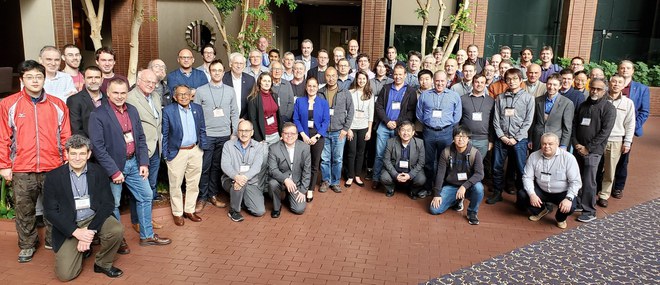Space VLBI 2020: Science and Technology Futures

Oral Presentation Abstract Book | Poster Presentation Abstract Book

Event Overview
Multiple space missions have demonstrated the potential for extremely high angular resolution observations, achieving interferometric baselines longer than the diameter of the Earth. New scientific results at millimeter wavelengths, from ALMA and the Event Horizon Telescope (EHT), suggest the possibility for obtaining even higher angular resolutions. This second meeting in The Future of High-Resolution Radio Interferometry in Space series will focus on mission concepts and supporting technology developments to enable the highest angular resolution observations at centimeter and shorter wavelengths (30+ GHz observing frequencies). The meeting will highlight recent scientific advances and developments in the motivations for future space-based very long baseline interferometry and the resulting technical requirements and challenges, building upon the foundation provided by the first meeting in the series: The Future of High-Resolution Radio Interferometry in Space.
Of particular interest are contributions in areas such as
- Science at extremely high angular resolutions (e.g., population studies of black holes, jets and accretion studies at all scales, GR testing and black hole physics);
- Apertures --- size and performance for space apertures;
- Receiver and detector technology status and performance;
- Data volume and transport;
- Clocks and synchronization;
- Orbital dynamics and u-v plane coverage;
- Orbit determination;
- Data processing (in-space vs. ground) for correlation and analysis;
- VLBI simulations for science cases;
- Optimization for mission concepts; and
- Concepts (particularly one large aperture vs. many small apertures in space).
There is also interest in exploring the opportunities made available by recent innovations for very long baseline interferometry and in space missions. Significant time will be made available for discussions, including on synergies with other upcoming facilities.
Invited Speakers
Andrey Baryshev Technical Developments for Millimetron
Ilse Cleeves The Future of ALMA
Leonid Gurvits & Vincent Fish The Future of High-Resolution Radio Interferometry in Space
Kari Haworth Volumes of Data: Onboard Storage and Fast Downlink
Yuri Kovalev RadioAstron
Yas Murata VSOP/HALCA
Eric Murphy The Future of the VLBA and the ngVLA
Pieter Visser Orbit Determination




Connect with NRAO